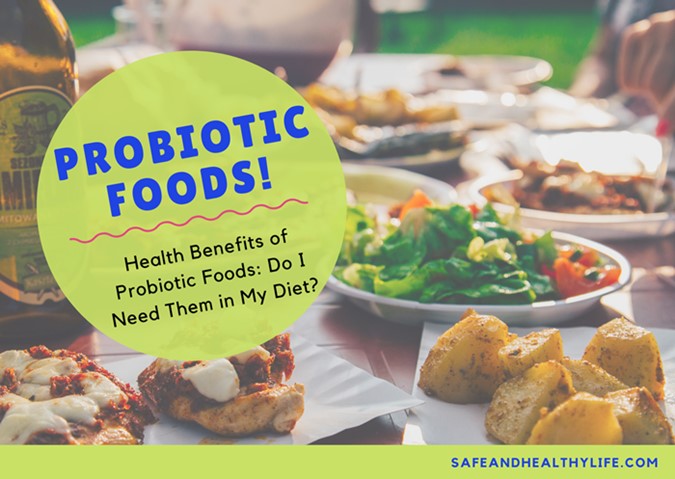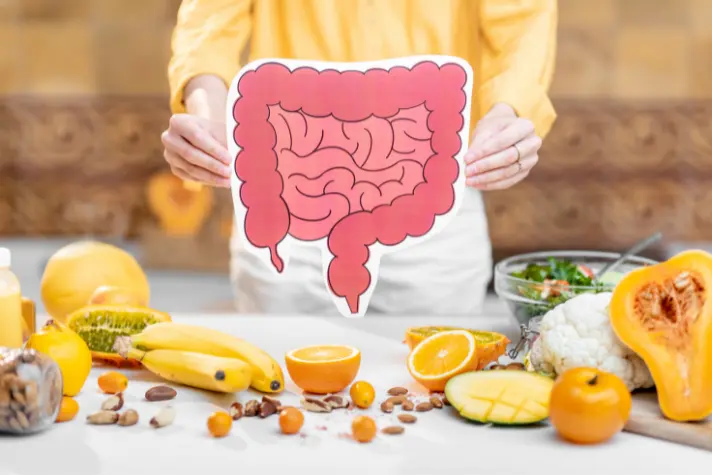
Your health is all you’ve got, and what you eat plays a crucial role in ensuring you live healthy and immune.
There are different types of food that you can eat to stay healthy. Every kind of food supports your body differently.
For instance, proteins are responsible for repairing worn tissues, and carbs will give you the energy you need to move around.
Well, another type of food that you need to spice up your diet is probiotic food.
In this post, we let you know all about the health benefits of probiotic foods and why you need them in your daily diet.
What are probiotics?
The answer to what are probiotic foods is simple – they are foods that contain microorganisms that can treat diseases in your body.
You can consume probiotics through supplements and fermented foods. Ideally, bacteria can be harmful to your body if it is found in the wrong place.
Bacteria have a lot of benefits if it is located in the right part of the body.
Studies have shown that the human body should contain equal amounts of harmful and helpful bacteria to be healthy.
The imbalance in body bacteria, also known as dysbiosis, can often result in diseases of the intestinal tract, such as celiac disease and irritable bowel syndrome.
The health benefits of probiotics
 Apart from ensuring a balance in gut bacteria, probiotics play a crucial role in ensuring overall body immunity, weight loss, and digestive health. Here are some other benefits of eating probiotic foods.
Apart from ensuring a balance in gut bacteria, probiotics play a crucial role in ensuring overall body immunity, weight loss, and digestive health. Here are some other benefits of eating probiotic foods.
- They increase the number of helpful bacteria in the gut.
- Probiotics reduce the risk of diarrhea, a common side effect of antibiotics.
- Taking probiotics supplements can boost some mental health conditions such as anxiety, OCD, and depression.
- Probiotics lower blood pressure and cholesterol hence keeping your heart healthy; they break bile and prevent its re-absorption in the gut.
- They reduce the risk of developing Eczema in infants.
- Probiotics minimize the symptoms of digestive disorders like inflammatory bowel disease and Crohn’s disease.
- They help in preventing the absorption of fat in the intestines hence contributing to weight loss.
- Probiotics boost body immunity by stopping the growth of harmful bacteria in the gut.
| Read also: What You Need To Know About Gut Health |
Types of probiotics
Extensive research in the use of probiotic supplements has led to the discovery of different kinds of probiotics. Today, many types of probiotics are known to contribute a lot to boosting body immunity.
Below are some examples of probiotics:
- Bifidobacteria: These are mostly found in the large intestines and play a crucial role in ensuring gut health. (Source)
- Lactobacillus: They live in the genitalia, urinary, and digestive systems. They are useful in treating many diseases and can exist in fermented foods like sour milk and yogurt. Over 50 species of Lactobacillus exist. (Source)
- Streptococcus Thermophilous: The bacterium is responsible for the production of vast amounts of lactase in the body. They help inhibit lactose intolerance in humans. (Source)
Foods that contain probiotics

Ideally, eating probiotics can benefit your body in many ways. Not all foods will contain helpful microbes that your body needs to stay healthy.
Below are some of the foods that you should look forward to eating if you intend to increase the number of helpful bacteria in your digestive system.
- Yogurt: This is the most common source of live probiotics responsible for bone health and reducing the risk of diarrhea.
- Kefir: The fermented milk drink contains bacteria needed by the body to help with digestive problems and prevent gut infections.
- Sauerkraut: This is a typical food in most European countries. It is shredded cabbage fermented with live bacteria and lactic acid. Food is responsible for making your eyes healthy.
- Tempeh: This is a fermented soybean that is very high in phytic acid. It is a rich source of vitamin B12 and contains helpful bacteria if taken in fermented form.
- Kimchi: This is a typical Korean dish that contains cabbage as the main ingredient. It contains bacteria and lactic acid that benefit the digestive system.
The side effects and risks of probiotics
Eating probiotics can have a lot of benefits for the body. However, some side effects result from eating probiotics. Here are some of them.
- If you’ve had surgery in the intestine, eating probiotics can reduce your chances of healing fast.
- Eating probiotics may trigger allergic reactions if you are taking them for the first time.
- They may cause health issues in pregnant women and infants. Therefore, you should not add probiotics to their diets without directions from a pediatrician.
How to take probiotics
There are varieties of probiotics that you can take to boost your digestive health. Here are some tips to help you take probiotics the right way.
- Always check the shelf life of the probiotic supplement before using it.
- Research widely to find out if the supplement you are taking contains the bacteria that you need for your condition.
- The microbes you take must have some health benefits.
- You can take at least a billion Colony Forming Units (CFUs) per day for better health.
- Ensure the probiotic food you take contains live microorganisms to get the promised benefits.
Misconceptions about probiotics
There is a lot to learn about probiotics. Probiotics may be useful in the body but still some misconceptions about them, which results in wrongful use.
Here are the misconceptions about probiotics that you should beware of.
- All fermented foods contain live culture.
- All yogurts contain active and live cultures.
- Foods like chocolate, wine, beer, and soya sauce are all probiotics.
Wrap up
Probiotic foods are necessary for the body, especially if you are looking forward to having a healthy digestive system. When you opt for probiotic foods, you must follow your diet as prescribed.
There are a lot of probiotic foods that you can prepare at home, but you must always be choosy to ensure you get the promised benefits in each type of food.
The information we have shared here on probiotics should give you another reason to update your menu and enjoy the myriad benefits of taking probiotics.
About The Author:
Anne Kamwila is a freelance content writer and a digital marketer. She is passionate about writing health, technology, and business-related guides, news, and books.



![3 Breathing Techniques Which Relieve Anxiety [And The Science Behind Them] Breathing Techniques Which Relieve Anxiety](https://www.safeandhealthylife.com/wp-content/uploads/2021/09/Breathing-Techniques-Which-Relieve-Anxiety-150x150.jpg)
